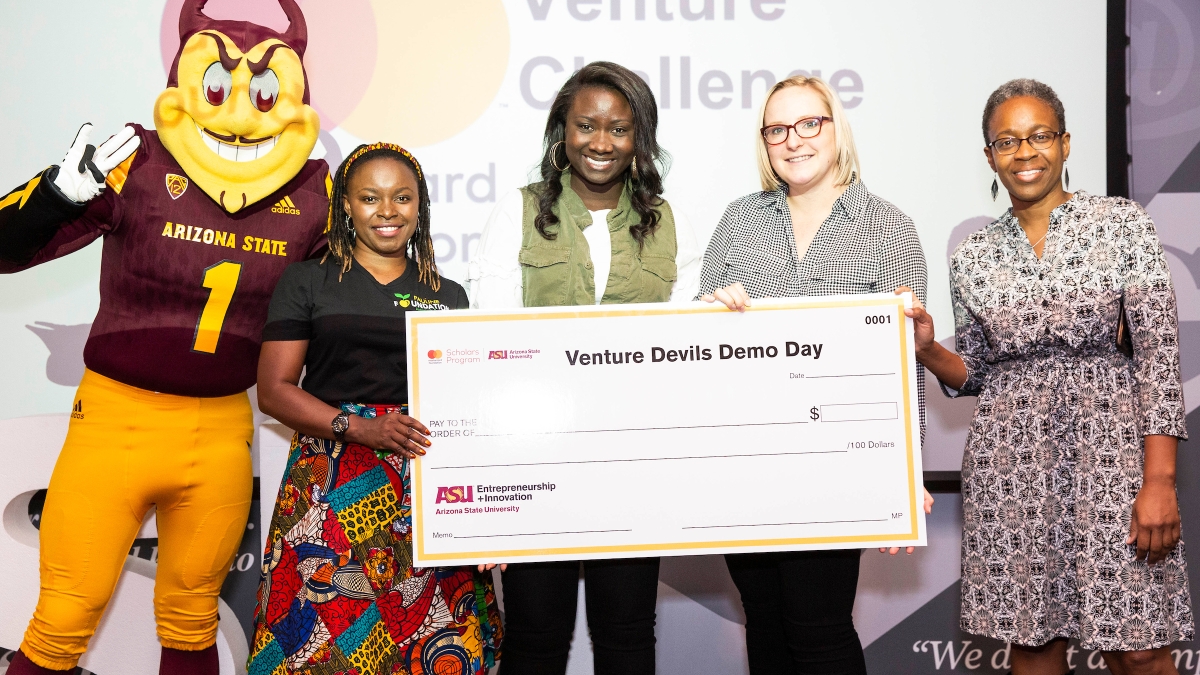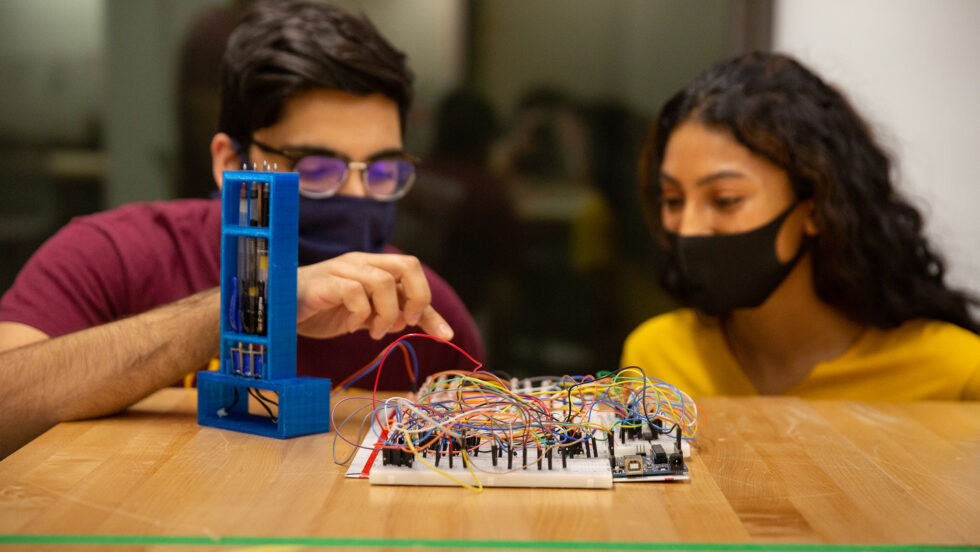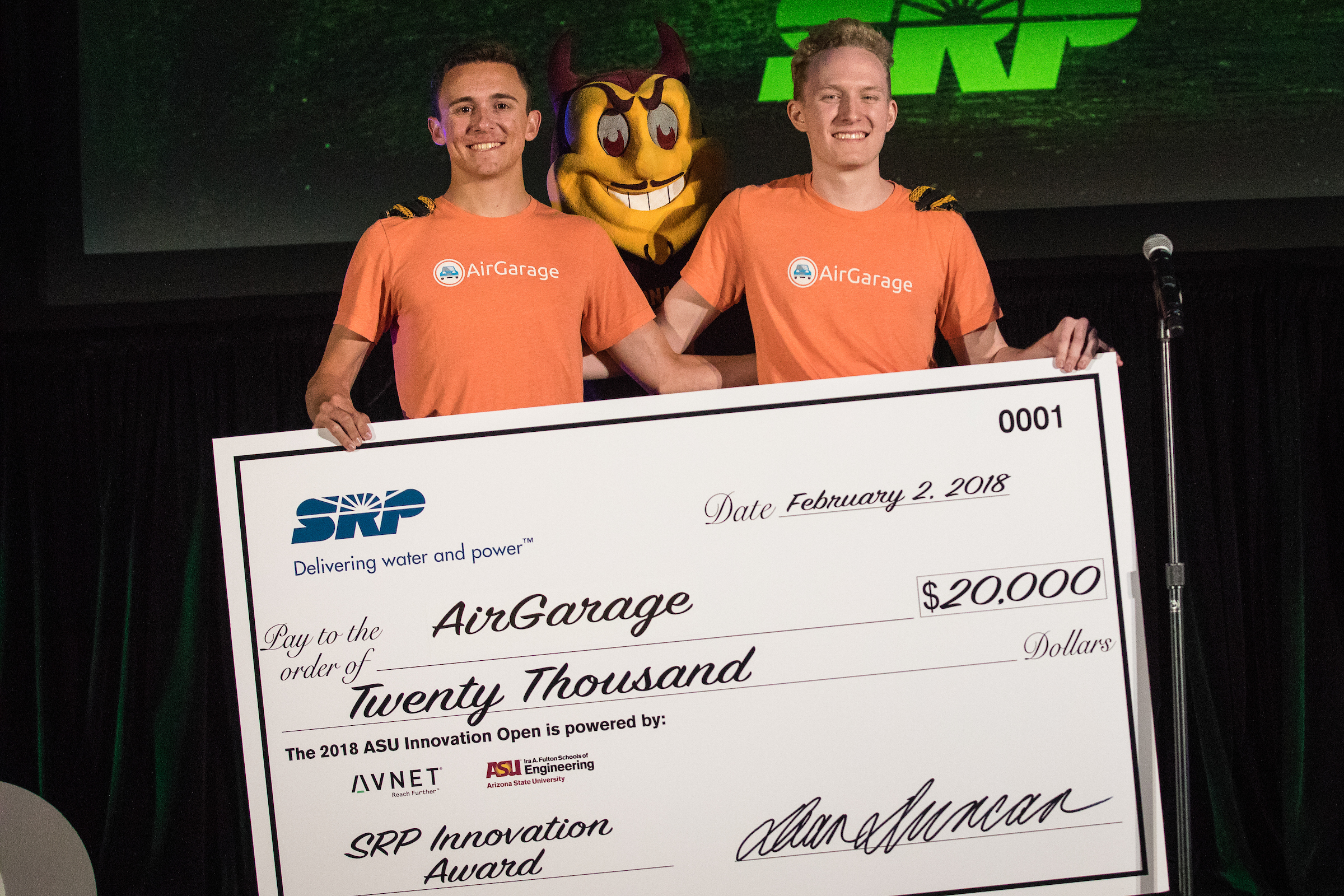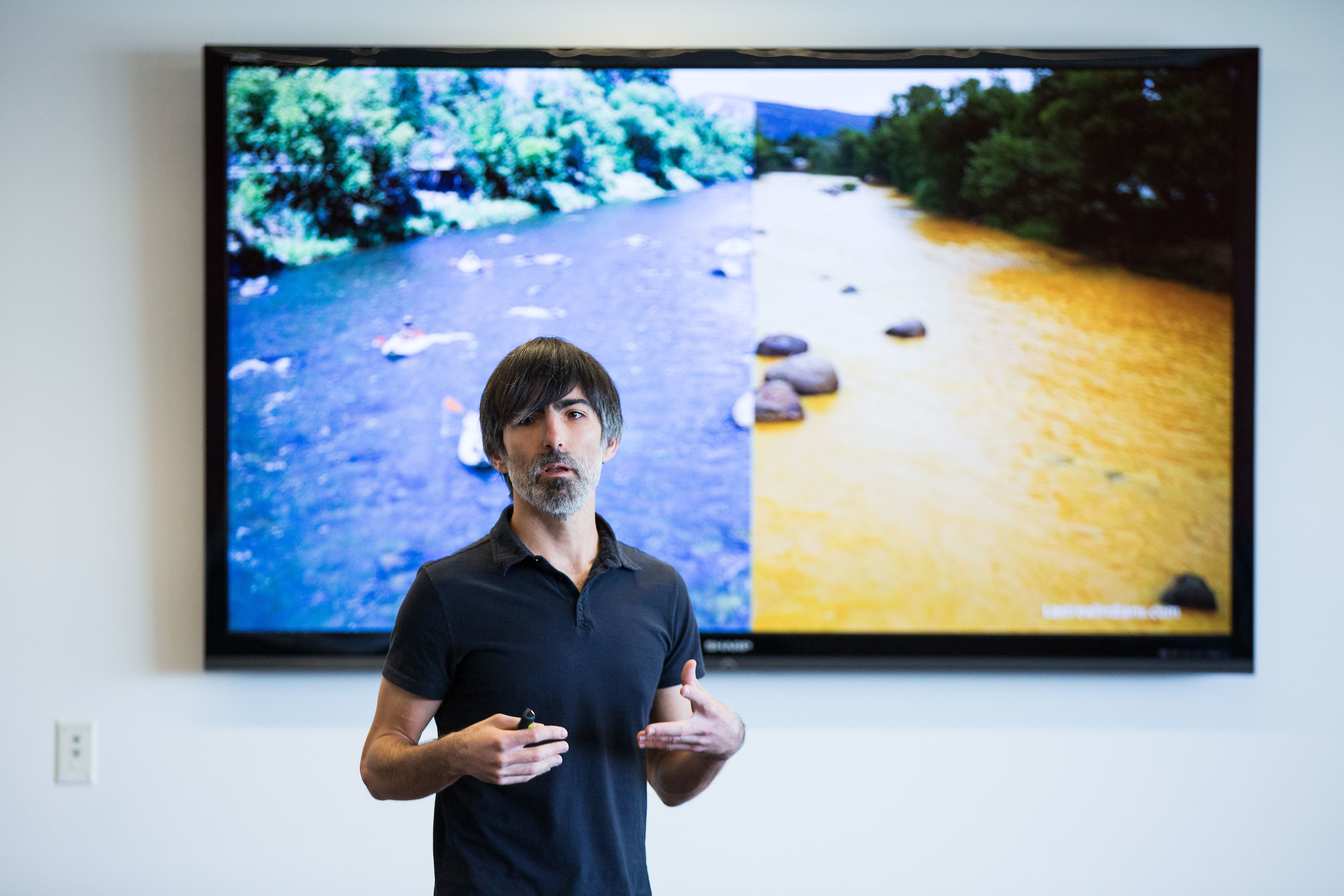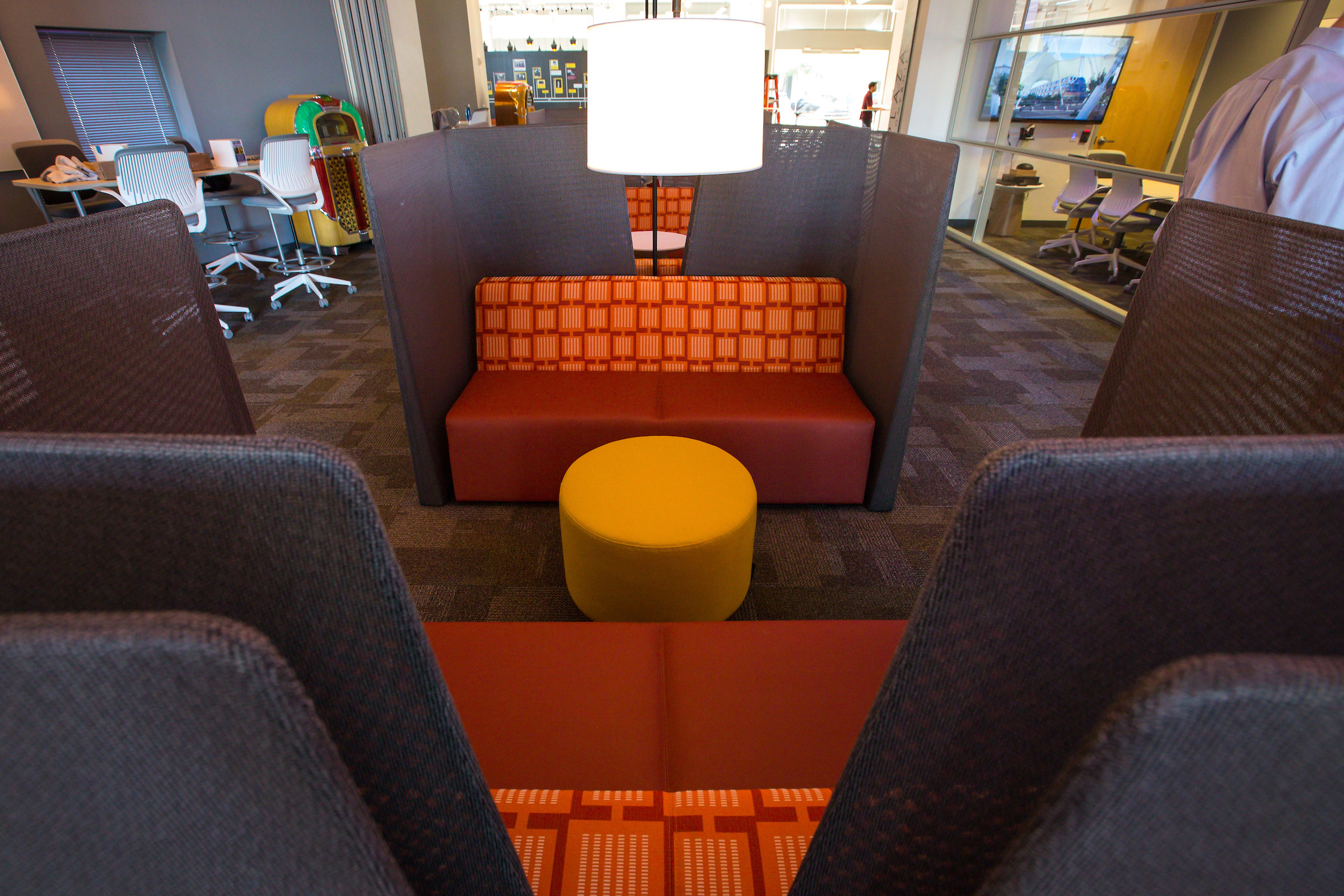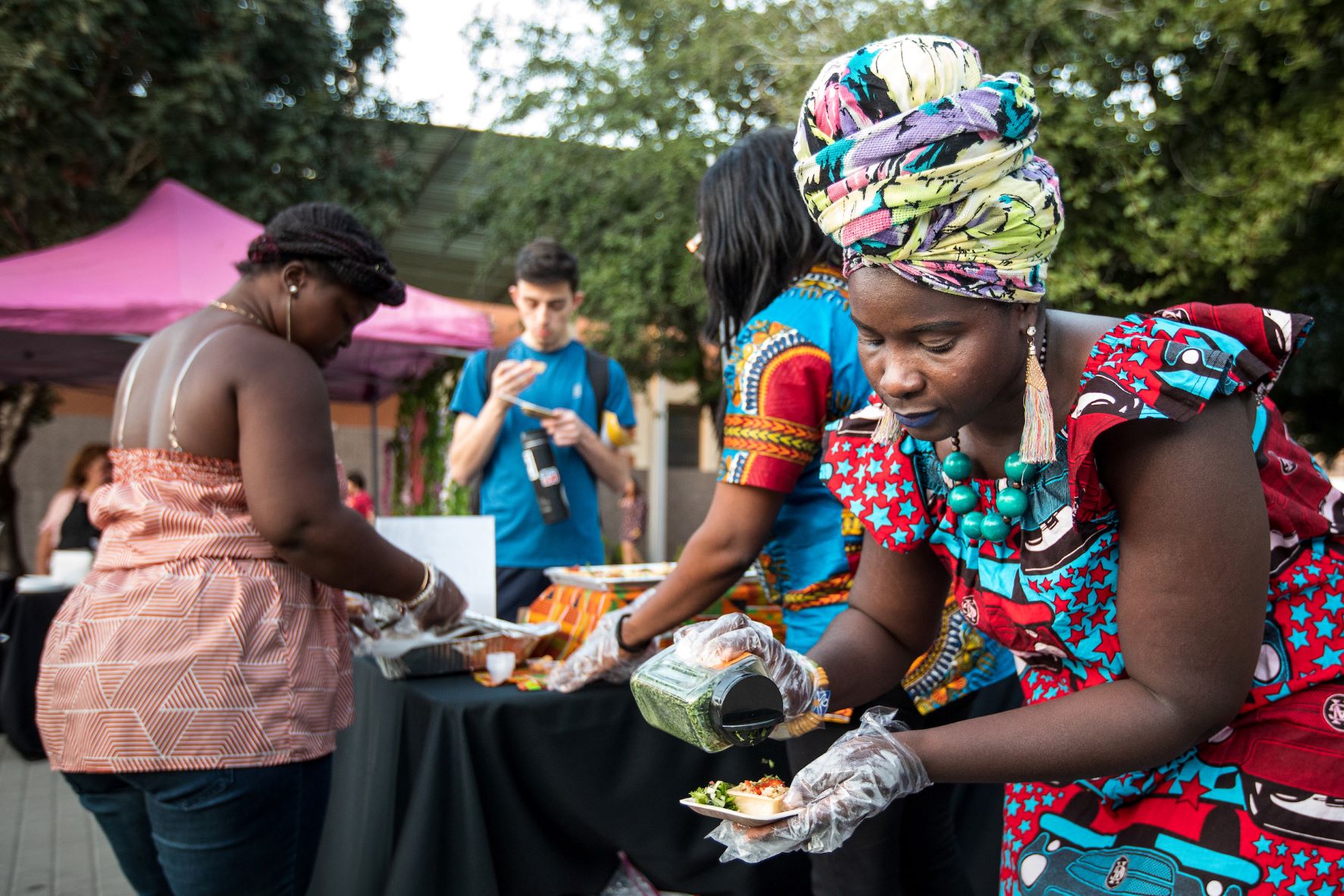What do you want to fix in the world? A nagging problem like parking, or a global crisis like infant deaths?
Pinpointing a problem and creating a solution — through endless rounds of trial and error — is entrepreneurship, a concept that’s so important, it’s embedded into the design aspirations of Arizona State University.
ASU offers a wide range of entrepreneurship resources to students (plus staff, faculty and alumni) who have an idea that they think just might work. The idea might be for a for-profit business or for a nonprofit organization.
For many students, all that collaboration and prototyping might not create anything beyond a nice memory and some good friendships.
Other entrepreneurs find big success after hours of hard work and pitching:
- NeoLight is a medical startup launched by a group of ASU students in 2014 aimed at eradicating infant deaths from jaundice with a phototherapy device. The company has raised more than $7 million from investors.
- In 2016, two ASU students created a marketplace called AirGarage to match drivers to parking spots around campus.
- A student at the Thunderbird School of Global Management at ASU, Pauline Nalumansi, created the nonprofit Pauline Foundation in 2017 to train young women in Uganda in tailoring, baking and hairstyling.
This year, students returning to campus after learning remotely due to the COVID-19 pandemic will find more entrepreneurship resources in more locations than ever before, led by the J. Orin Edson Entrepreneurship and Innovation Institute. The institute is marking its first anniversary on Sept. 2, when ASU’s existing entrepreneurship program was named for J. Orin Edson, a successful, self-made businessman who had supported ASU for several years. The new gift allowed ASU to expand its entrepreneurship network for students, faculty, staff and community members.
“We are a significant engine in the rate of new business formation,” said Ji Mi Choi, vice president of ASU Knowledge Enterprise and the founding executive director of the J. Orin Edson Entrepreneurship and Innovation Institute.
“Ironically, nationwide, we’re at the lowest new-business formation rate since the 1970s,” she continued.
“That’s why universities like ours are so important — we’re one of the engines for generating and supporting business startups.”
Students who aren’t sure where to begin can access the “Just Start Guidebook.”
Here’s an overview of resources that ASU offers to potential entrepreneurs.
In the classroom
ASU offers several undergraduate degrees focused on entrepreneurship in areas including health, bioscience, business, music, engineering and food and nutrition. There are nearly two dozen graduate degrees and certificates available.
EPICS is a program in the Ira A. Fulton Schools of Engineering in which student teams design solutions to engineering-based problems for charities, schools and nonprofit organizations.
GlobalResolve was launched in 2006 as a social entrepreneurship program to provide students in Barrett, The Honors College, with real-world projects that help communities around the world.
The Lisa Foundation Patent Law Clinic provides experience in licensing and litigation to students in the Sandra Day O’Connor College of Law, who help inventors and startups with their patent applications.
ASU students Rajat Arora (left) and Nadia Jafar work together in the eSpaces to prototype the hardware component of their Engineering Projects in Community Service (EPICS) project, which is a refreshable Braille display that can transcribe text on the screen into physical Braille. Photo by Connor McKee/ASU
Venture Devils
The main resources available to budding entrepreneurs are space, funding and mentorship.
In 2005, a gift from J. Orin Edson and his wife, Charlene, created the Edson Student Entrepreneur Initiative, which provides specialized attention to the 20 student teams who are in the program, plus a chance to win up to $20,000. The AirGarage and NeoLight teams are among the Edson winners.
But with ASU’s size, the university wanted to create opportunities for more students, Choi said.
“So we tried to create a framework to be more methodical and to scale what we do, to provide high-quality services to many more teams,” she said.
Venture Devils was launched in 2016. Teams apply to Venture Devils, identifying themselves as entrepreneurs, and then have access to training and mentorship in addition to the funding, which is awarded at pitch competitions.
In fall 2016, there were 150 teams in Venture Devils. The spring 2020 semester had 548 teams, and spring 2021 saw 760 teams participate.
Why the big pandemic increase in participation?
“People had more time,” Choi said.
New this year will be an open entrepreneurship studio in the W. P. Carey School of Business for students who aren’t ready to sign up for Venture Devils yet.
“It’s for students who say, ‘I know I want do something in entrepreneurship, but I don’t have an idea yet,’ to connect with those who say, ‘I wish somebody would invent this,’“ Choi said.
“It’s a platform that allows creators and problem-solvers to work on something.”
Students Jonathon Barkl (left) and Scott Fitsimones won $20,000 for their startup, AirGarage, at the ASU Innovation Open in February 2018. Photo by Charlie Leight/ASU News
Funding
Students can apply for funding at every stage of entrepreneurship — idea, startup and scaling up.
“We’re like the ‘friends and family’ round. We’re the first money in for these ideas,” Choi said.
“Sometimes that first money will resolve the ‘go’ or ‘no go.' It’s incredibly important for someone to decide, ‘Do I do this?’
“Not everyone has parents they can ask, ‘Can you give me $20,000 to see if this has legs?’"
Funding through Venture Devils mirrors venture capital, in which an enterprise gets a small amount of seed funding to start, then at each stage of success draws more investment.
“The idea is to continuously have a way to show progress and advance before taking in more money,” she said.
“So we structured our funding network to be the right amount at the right time. You’re not going to give someone in the very early idea stage $20,000.”
None of the funding carries an expectation of success.
“No one can guarantee that – that’s what entrepreneurship is.”
Pitch competitions
The range of pitch competitions not only provides funding but also allows students, and others in the ASU community, the chance to describe their ideas, get feedback and then refine them.
Students can learn how to tell the story of their venture at Launch Days events, held at various campus locations in September and February.
The Woodside Community Action Grant is a competition held by Changemaker Central for ASU students to win small amounts for service projects in the community.
PitchFunder teaches Sun Devils how to raise funds for charitable projects, events and organizations.
Demo Days are the premier event for startup funding, awarding tens of thousands of dollars in multiple funding tracks, including the Edson initiative. The daylong pitch competitions are held on the last day of the fall and spring semesters. Each team presents a short pitch, followed by questions from a panel of entrepreneurial experts. Many teams pitch to more than one funding track.
The COVID-19 pandemic forced Demo Days to become a live Zoom event, with teams creating video pitches.
Going forward, Demo Days will likely be a hybrid event held at different locations, connected via video synchronously.
“One of the things we learned during the pandemic is that going online can remove barriers to participation,” Choi said.
CEO Bradley Lusk presents his company, Precient Technologies — which focuses on removing usable metals from water — at the Emerging Innovations competition during the Demo Days at Skysong in 2018. Photo by Deanna Dent/ASU News
Place-based innovation
The Edson Institute offers several collaborative, event and maker spaces around the metro area, including 1951 @ Skysong in Scottsdale, the ASU Chandler Innovation Center and Hub249 Makerspace, the Phoenix Forge Makerspace, and the Innovation Hub on the Polytechnic campus.
“Space is an important resource because it allows people to work, meet other people and have a cross-pollination of ideas,” Choi said.
“In a really successful coworking environment, people will partner, engage each other’s services and start to refer. They’re connecting because it’s late at night and that same person is there grinding away too, and you get a chance to chat about it.”
This semester, the Edson Institute will be moving into the new high-rise residential building at the Downtown Phoenix campus called Fusion on First. The building will include 13 floors of apartment-style student housing and two floors of classroom space, housing the fashion and popular music majors from the Herberger Institute for Design and the Arts.
The Edson Institute will provide coworking, meeting and event space on the first floor, along with two pop-up retail spots.
“We might have fashion students who have the opportunity to actually sell the things they’re making,” Choi said. “Or it might be through our Retail Devils program with Follett.
“This is the continuation of our leveraging of spaces, where the idea is to work with residents in the building who are looking to launch an enterprise, to be a community resource and to have this good mix between students, faculty, mentors and experienced entrepreneurs in downtown Phoenix.”
In March, the Edson Institute expanded into the new Wexford Innovation Center, where it has 4,500 square feet on the first floor for coworking, meetings and events.
The 1951 room at Skysong provides a coworking area for startup businesses.
Mentoring
ASU has cultivated dozens of mentors, including successful entrepreneurs who have launched multiple businesses, faculty members, subject-matter experts and former students who have had entrepreneurial success.
Entrepreneurship Catalysts are current students who are like entrepreneurship ambassadors — connecting budding entrepreneurs to all of the resources available and providing coaching and feedback.
Community programs
The Edson Institute’s reach is far beyond ASU’s campuses, supporting all entrepreneurs, with targeted programs for community college students, women, people of color and Native Americans.
Some programs are for K–12 students, including the National Youth Entrepreneurs, a collaboration with Verizon in which ASU provides curriculum and professional development for teachers, and EPICS High, a high school version of the EPICS program.
Others are collaborations with local governments, such as the Resource Innovation and Solutions Network Incubator, with the city of Phoenix, and Peoria Forward.
“What we try to do is fill in the gaps,” Choi said of the community programs. “It’s about connectivity and how we can leverage ASU resources, knowledge and reputation. We never want to be duplicative, and we’re not here to be the next ‘Shark Tank.’
“We can act as a concierge — ‘Have you met this person?’ or ‘Do you know that this resource is available?’ We’ve had workshops on how to apply for PPP loans.”
Another community program is Prepped, now entering its fifth year of supporting food truck entrepreneurs.
“We very specifically chose mobile food because it’s a lower bar to access and less capital intensive than signing a 10-year lease for a restaurant and hiring three or four people,” she said.
So far, the free program has served 100 entrepreneurs, most of them women and underrepresented minorities.
“They weren’t asking for help with recipes or ingredient sources,” Choi said. “They had these great recipes that were passed down.
“What we did was offer support with pricing, social media, marketing. How do people know your hours? How do you optimize good business?
“It had a very high impact because it was very specific to what they needed.”
Choi is excited because some of the entrepreneurs from the first Prepped cohorts have become mentors.
“We’re seeing this cohort of people who have become close-knit and supporting each other, and that’s a nice outcome,” she said.
Lovelyn Omari of Ohemaa Afro Fusion Cuisine prepares a dish at the Prepped Showcase on ASU's Downtown Phoenix campus in October 2019. Photo by Charlie Leight/ASU News
Top image: Pauline Nalumansi (second from left) poses with the MasterCard Foundation Challenge project administrators, Enyah Abadjivor (left), Emily Taylor and Tamara Webb, who was director of the Mastercard Foundation Scholars Program at ASU at the time, at Demo Day in April 2019. A student at the Thunderbird School of Global Management in 2019, Nalumansi won funding from the MasterCard Foundation Challenge for her nonprofit, Pauline Foundation. Photo by Charlie Leight/ASU News
More Business and entrepreneurship

With help from ASU and a viral TikTok, an entrepreneur soars
Nearly five years ago, Ruben Trujillo saw his entrepreneurial dream slipping away as he wondered how he would pay his rent.Now, Trujillo’s business, Café Emporos, is featured on a national TV…

Honoring 2 decades of entrepreneurial impact on a global scale
Thunderbird for Good, the impact-driven initiative of Thunderbird School of Global Management at Arizona State University, is marking two decades of educational programs and initiatives dedicated to…

ASU and GoDaddy launch Student Athlete Venture Studio
In a groundbreaking initiative aimed at empowering college athletes beyond their playing careers, Arizona State University and GoDaddy teamed up to launch the first-of-its-kind Student Athlete…


